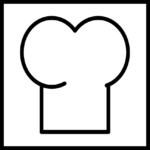1200 Cooking White Belt
The Professional Cooking 1200 badge by CAIBOK provides an introductory understanding of professional culinary foundations, including kitchen management, safety, and cooking techniques. This badge is aimed at aspiring chefs and culinary professionals who wish to establish a strong foundation in the culinary arts. To earn this badge, members must pass an exam based on the following topics.
1201 Basic Kitchen Tools
Introduction to the fundamental kitchen tools every chef must know and how to use them. Focuses on the importance of knife skills and the use of measuring devices, with guidelines for maintaining and storing kitchen tools to ensure their longevity and safety.
1202 Cookware and Bakeware
Exploration of the types of cookware and bakeware necessary for different cooking techniques. Discusses materials and their properties, such as conductivity, durability, and maintenance requirements. Tips for selecting the right pieces for specific culinary tasks are also provided.
1203 Appliances
Key appliances in a professional kitchen, from stoves to mixers and blenders. Instructions on how to operate common kitchen appliances safely and efficiently. Maintenance tips to keep appliances in optimal working condition are also included.
1204 Specialty Tools
Introduction to specialized tools that enhance culinary techniques like sous-vide, smoking, or molecular gastronomy. Discussion on when and how to use these tools to elevate culinary creations, along with care and maintenance of specialty tools to maximize their use.
1205 Storage and Organization
Best practices for organizing a professional kitchen for an efficient workflow. Storage solutions for tools, cookware, and ingredients. The importance of a well-organized kitchen in maintaining cleanliness and reducing waste is emphasized.
1206 Mise en Place
The concept of ‘everything in its place’ as a crucial preparatory practice for professional cooking. Steps to effectively set up and organize ingredients and tools before cooking. How mise en place contributes to smoother operations during service hours.

